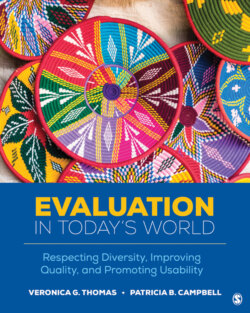Читать книгу Evaluation in Today’s World - Veronica G. Thomas - Страница 69
На сайте Литреса книга снята с продажи.
Cultural Competence as an Ethical Imperative
ОглавлениеEvaluators oftentimes work in settings that represent a very different cultural context than their own. The updated AEA (2018b) Evaluators’ Ethical Guiding Principles highlight the need to mindfully and proactively attend to diversity, equity issues, and common good as prerequisites for ethical practice. Evaluators have an ethical obligation to be culturally competent and to create an inclusive climate in which everyone invested has an opportunity to fully participate in the evaluation process. In the updated preface to the Evaluators’ Ethical Guiding Principles, a culturally competent evaluator is described as one who
draws upon a wide range of evaluation theories and methods to design and carry out an evaluation that is optimally matched to the context; the evaluator reflects the diverse values and perspectives of key stakeholder groups. (AEA, 2018b, p. 1)
The AEA (2011) has also issued a Public Statement on Cultural Competence in Evaluation. This statement challenges evaluators to deepen their self-awareness and sensitivity in terms of their own cultures and those of others and to acquire the necessary skills to bridge the cultural gaps between themselves and those in the evaluation context. Cultural competence in evaluation is a reflective activity requiring evaluators to achieve and maintain a high degree of self-awareness and self-examination to better understand how their own cultural backgrounds and life experiences can serve as either assets or limitations in the conduct of an evaluation. Specific examples of ethical practice related to cultural competence offered by the AEA in its Public Statement on Cultural Competence include the following:
Use approaches that are appropriate to the context; for example, verbal consent can be used in communities with oral traditions, high levels of concern about privacy, or low levels of literacy.
Engage issues of culture directly, respectfully, and fairly when collecting data, making interpretations, and forming value judgments.
Incorporate ways to make findings accessible to all stakeholders, including forms of communication beyond written texts and the use of languages other than English.
Consider unintended consequences when reporting findings; for example, in some cultural contexts, participants in evaluations who are proud of their accomplishments may want to forgo anonymity and have their names attached to their stories. While this may be appropriate in some instances, in other situations the identification of participants may infringe on the rights of people who have not given informed consent.
